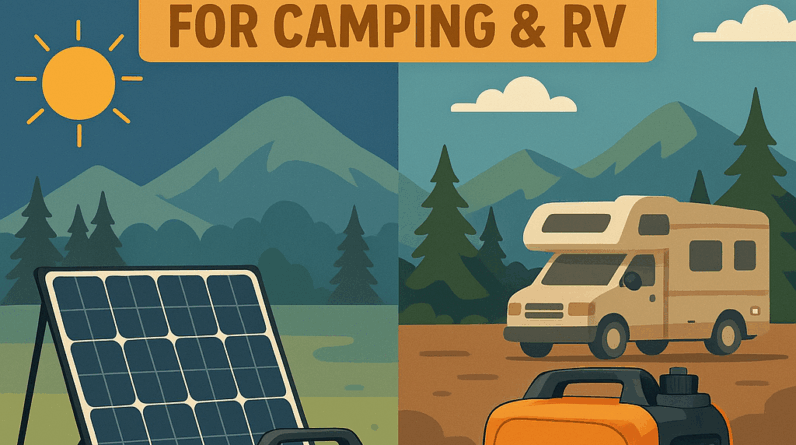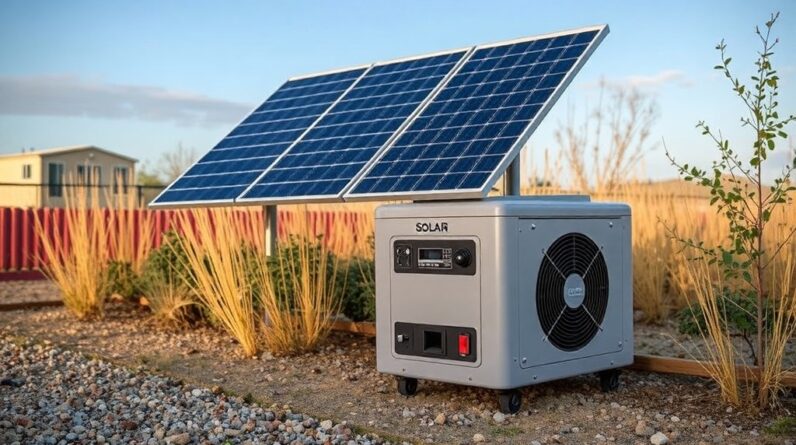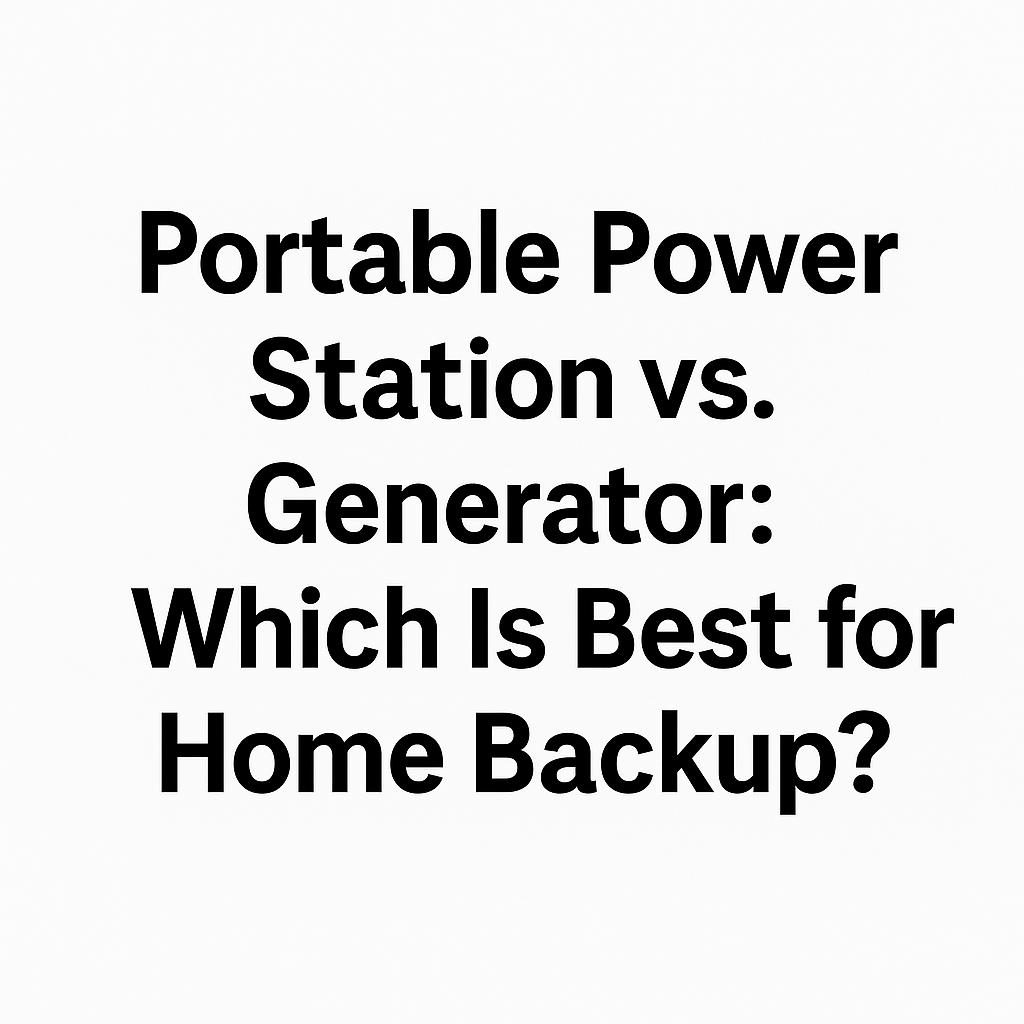
This post contains Amazon affiliate links.
The Benefits of Using a Solar Backup Generator for Homeowners
If you are a homeowner looking for reliable power solutions, incorporating a solar backup generator into your system might just be your ideal choice. A solar backup generator harnesses the energy of the sun, providing an eco-friendly power source when traditional electricity fails. Here’s a closer look at the numerous benefits of using a solar backup generator in your home.
Cost-Effective Energy Solution
One of the key benefits of a solar backup generator is its cost-effectiveness. By utilizing sunlight, you reduce your reliance on the electrical grid. This translates to lower energy bills over time. Once you invest in solar panels and the generator, much of the energy produced is free, especially on sunny days. This long-term savings can significantly impact your budget.
Environmentally Friendly
Solar backup generators are among the cleanest sources of energy available today. They produce no harmful emissions, making them a sustainable choice compared to traditional fossil fuel generators. By choosing this renewable energy option, you help reduce your carbon footprint, contributing to a healthier planet. Every time the generator kicks in, you’re supporting environmental conservation.
Reliable Power During Outages
Power outages can occur unexpectedly and often at the most inconvenient times. A solar backup generator provides peace of mind knowing that you have a reliable form of power ready when you need it most. Whether it’s a natural disaster or just a regular blackout, having a solar generator at your disposal ensures that your home remains powered.
Low Maintenance Requirements
Compared to traditional generators, solar backup generators have fewer moving parts and require minimal maintenance. The absence of fuel and the need for oil changes simplifies your upkeep tasks. Routine cleaning and occasional checks are typically all that’s needed to keep your system running efficiently. This convenience often appeals to busy homeowners.
Energy Independence
By investing in a solar backup generator, you achieve a level of energy independence that traditional electricity cannot provide. This means you are less dependent on your local utility and less vulnerable to rate hikes or outages. You’ll feel empowered knowing that you control your power source.
Easy Installation
Installing a solar backup generator may be simpler than you think. Many units are designed for easy setup and can often be connected to existing solar panel systems. If you already have solar panels, adding a generator can be as straightforward as linking the two systems. Professional installation may still be an option to ensure everything works seamlessly, but for those who are handy, some systems allow for do-it-yourself installation.
Enhanced Home Value
Homebuyers are increasingly looking for energy-efficient solutions. Having a solar backup generator can make your home more attractive in the real estate market. It reflects modern amenities and a commitment to sustainability. Properties with renewable energy solutions often see a rise in value when it comes time to sell.
Versatility in Usage
Another fantastic benefit of solar backup generators is their versatility. Whether you’re powering your refrigerator, heating your home, or using electronic devices, these generators can handle various power needs. Depending on the model you choose, you might even be able to run multiple appliances at once.
Silent Operation
Noise can be a significant downside of traditional generators. Thankfully, solar backup generators operate quietly, allowing you to enjoy a peaceful environment even when the power goes out. This is particularly advantageous at night or in residential areas where noise restrictions may apply.
Investment in Future Technology
Investing in a solar backup generator means you’re investing in the future. As technology progresses, solar generators are becoming more efficient and cost-effective. Embracing this renewable resource is a step toward being part of an innovative shift in power generation, creating more opportunities down the line for energy efficiency.
A solar backup generator presents countless advantages for homeowners. By offering reliable power, environmental sustainability, and cost savings, it’s no wonder more individuals are making the switch. Making the decision now might save you both hassles and expenses later, ensuring your home remains powered, no matter the situation.
How Solar Backup Generators Work: Understanding the Technology
If you’re considering a solar backup generator, it’s essential to understand how this technology works. Solar backup generators are an excellent solution for providing energy when the grid goes down, ensuring your home stays powered during outages. They use solar panels, batteries, and inverters to harness the sun’s energy and store it for future use. Here’s a closer look at the science behind these handy devices.
How Solar Panels Gather Energy
Solar panels, also known as photovoltaic (PV) panels, are made up of numerous solar cells that convert sunlight into electricity. When sunlight hits these cells, they create an electric field that generates a flow of electricity. Here’s how it works:
- Photons Hit the Cells: When sunlight strikes the solar cells, the energy from photons gets absorbed.
- Electrons Are Released: This absorbed energy frees electrons from the atoms in the solar cells.
- Electric Current is Generated: The movement of these freed electrons creates an electric current, which can then be harnessed for power.
Storing Energy in Batteries
After generating electricity, the next step involves storing that energy for use during an outage. This is where batteries come into play. Solar backup generators typically utilize lithium-ion batteries, which offer several advantages:
- High Efficiency: Lithium-ion batteries have a high charge-discharge efficiency, making them effective at storing solar energy.
- Long Lifespan: They can last for years, providing peace of mind and reliability.
- Fast Charging: These batteries can be charged quickly, allowing for efficient use of collected solar energy.
When the grid goes down, your stored energy can be drawn from these batteries to power your essential appliances, electronics, and lights. This system allows you to maintain a comfortable lifestyle, even during outages.
Using an Inverter to Convert Energy
Solar backup generators also include an inverter, which plays a critical role in the system. The inverter converts the direct current (DC) generated by solar panels and stored in batteries into alternating current (AC), which is what most household appliances use. Here’s how it works:
- Conversion: The inverter takes the DC from the batteries and changes it to AC.
- Powering Your Home: This AC power can now be used to power your home, keeping your devices and appliances functioning normally.
- Bidirectional Functionality: Some advanced inverters can also send excess power back to the grid, potentially reducing your energy bill.
Monitoring and Control Systems
Modern solar backup generators often come with smart monitoring systems that allow users to control their energy usage effectively. These systems can provide information such as:
- Energy Production: How much energy your solar panels are generating.
- Battery Status: Current charge level of your batteries to avoid depletion.
- Usage Tracking: Monitor how much energy you are using, helping you make informed decisions.
By utilizing mobile apps or dashboards, users can efficiently manage their solar backup generator system, ensuring optimal performance and energy conservation.
Benefits of Solar Backup Generators
Choosing a solar backup generator comes with numerous benefits that make them a smart investment:
- Energy Independence: You’re less dependent on the grid and can generate your power.
- Cost Savings: Reduce your electricity bills and save money in the long run.
- Environmentally Friendly: Solar energy is renewable and helps reduce carbon footprints.
- Reliability: Enjoy a dependable power source during emergencies.
While solar backup generators may require an upfront investment, the long-term savings and benefits often justify the cost. Understanding how they work not only helps you make an informed decision but also enables you to utilize this technology to its fullest potential.
Solar backup generators combine solar panels, battery storage, and inverters to create a reliable energy source. As technology continues to advance, these systems are becoming more efficient, user-friendly, and essential for those seeking energy autonomy. If you find yourself frequently facing power outages or wish to decrease your carbon footprint, investing in a solar backup generator could be the perfect solution for you.
Comparing Solar Backup Generators to Traditional Generators
When the lights go out, you want to ensure you have a reliable power source to keep your essential devices running. This is where a backup generator comes in. With advancements in technology, solar backup generators have become increasingly popular. Let’s take a closer look at how they stack up against traditional generators.
Understanding the Basics
A traditional generator runs on either gasoline, diesel, or propane. They are powerful and can produce a substantial amount of electricity, depending on the model. However, they come with some downsides. On the other hand, solar backup generators harness energy from the sun. They use solar panels to collect sunlight, which is then converted into electricity. This clean energy source presents several advantages that might make you rethink your approach to backup power.
Cost-Effectiveness
Initial costs can be a significant factor in choosing your generator:
- Traditional Generators: Generally, these have a lower upfront cost, but they require ongoing fuel purchases and maintenance. Over time, that can add up considerably.
- Solar Backup Generators: While these typically have a higher price tag from the start, they use freely available sunlight as fuel, which means no recurring costs. Additionally, many solar generators require less maintenance.
Environmental Impact
Environmental considerations are becoming crucial in our choices:
- Traditional Generators: These generators burn fossil fuels, releasing harmful emissions into the atmosphere. They contribute to air pollution and global warming.
- Solar Backup Generators: By harnessing the sun’s energy, they produce no emissions. This makes them a much cleaner option, reducing your carbon footprint and supporting a healthier planet.
Noise Levels
Noise can be a major concern, especially in residential areas:
- Traditional Generators: These can be quite loud, often producing noise levels that can disturb your neighbors and disrupt your peace.
- Solar Backup Generators: They operate quietly, which is perfect for keeping things serene during a power outage or for camping trips.
Portability and Convenience
The usage scenario often dictates the type of generator you might need:
- Traditional Generators: Many models can be heavy and cumbersome, making them less portable. Moving them requires effort, especially if you need it in different locations.
- Solar Backup Generators: These are generally lighter and designed for easy transport, ideal for camping or outdoor activities. Plus, they can be charged in various locations with direct sunlight.
Power Output and Reliability
When you need critical power, reliability is key:
- Traditional Generators: Often have higher power output capacities, making them suitable for larger appliances and tools. If you require consistent high power, they may be the better option.
- Solar Backup Generators: Tend to have lower power output, making them suitable for essential devices like phones, lights, or refrigerators, particularly in emergencies.
Ease of Use and Setup
A generator should be easy to set up when you need it:
- Traditional Generators: They usually require fuel, oil changes, and sometimes extensive setup, which can be daunting during emergencies.
- Solar Backup Generators: Generally, these are easier to use. Set them up with solar panels in sunlight, and you can start generating power immediately.
Long-Term Viability
When considering your power options, think about the long game:
- Traditional Generators: They may serve you well, but the eventual need for repairs and maintenance can be a hassle.
- Solar Backup Generators: These often come with long-lasting batteries and solar panels that require minimal upkeep, supporting years of usage without significant replacement costs.
In the end, your choice between a solar backup generator and a traditional generator boils down to your specific needs and preferences. If you value environmentally friendly features and low operating costs, a solar generator is a strong contender. However, if you require high power and don’t mind managing fuel expenses, a traditional generator might be more suitable. Evaluate your requirements, budget, and lifestyle before making a decision that works best for you.
Top Solar Backup Generators on the Market: An In-Depth Review
Finding a reliable power solution can be a challenge, especially when faced with unexpected outages. A solar backup generator offers a sustainable and efficient way to keep your home powered when the grid fails. In this review, we’ll evaluate the top solar backup generators on the market, highlighting their features, benefits, and suitability for different needs.
1. Jackery Explorer 1000
The Jackery Explorer 1000 is a customer favorite that combines portability with impressive power capacity. It features a 1,000W pure sine wave inverter and a 1,002Wh lithium battery capacity, making it ideal for charging medium to large appliances. One of its standout features is the ability to be recharged via solar panels or an AC outlet.
- Weight: 22 lbs
- Ports: 2 AC outlets, 2 USB-C ports, 2 USB-A ports
- Recharge Time: 8 hours with solar panels
This generator is perfect for camping trips or as an emergency backup. Users appreciate its quiet operation and ease of use, making it suitable for families or individuals who aren’t tech-savvy.
2. Goal Zero Yeti 1500X
The Goal Zero Yeti 1500X is designed for serious off-grid enthusiasts. With a 1,500W inverter and 1516Wh battery capacity, it can handle multiple devices simultaneously. The unit also has a robust set of ports, including AC, USB-C, and a car port, making it versatile for any situation.
- Weight: 45 lbs
- Ports: 2 AC outlets, multiple USB ports
- Recharge Time: 14 hours with a solar panel
This generator is highly regarded for its heavy-duty build and ability to power refrigerators, laptops, and other high-wattage appliances. If you are looking for a solution for longer outages or off-grid living, the Yeti 1500X should be on your radar.
3. EcoFlow Delta 1300
For those seeking a balance between portability and power, the EcoFlow Delta 1300 is an excellent choice. With a remarkable 1,300W inverter and a 1,260Wh capacity, this generator is compact and still incredibly powerful.
- Weight: 30 lbs
- Ports: 6 AC outlets, multiple USB ports, car port
- Recharge Time: 1.6 hours from AC; 4.5 hours from solar
One unique feature is its X-Boost technology, which allows it to power appliances up to 1,800W. This flexibility makes it suitable for both home backup and outdoor adventures.
4. Bluetti AC200P
The Bluetti AC200P stands out with its 2,000W inverter and 2,000Wh lithium battery capacity. This powerful generator can serve as a reliable home backup system, capable of powering a wide variety of household appliances seamlessly.
- Weight: 57 lbs
- Ports: 6 AC outlets, USB ports, car port, and wireless charging
- Recharge Time: 5 hours AC; 8 hours from solar
It’s equipped with advanced battery management technology, allowing for a longer lifespan and greater safety. Customers often commend the numerous output options, making it easy to keep everything powered.
5. Renogy Phoenix 246.24 Wh
For light usage and portability, the Renogy Phoenix 246.24 Wh is a compact option. Weighing only 6.7 lbs, it’s perfect for short camping trips or powering small devices.
- Weight: 6.7 lbs
- Ports: 2 AC outlets, USB ports, and DC port
- Recharge Time: 3-4 hours from solar
Despite its smaller capacity, the Phoenix is user-friendly and efficient, making it popular among casual users and those new to solar power.
Selecting the right solar backup generator depends on your specific needs. Whether you require a robust system for home backup or a lightweight option for your outdoor adventures, these top five generators offer excellent options. By considering the power capacity, weight, and charging options of each model, you can make an informed decision that best suits your lifestyle. Take a step towards energy independence today with the right solar backup generator!
Installation and Maintenance Tips for Your Solar Backup Generator
Installing and maintaining your solar backup generator is essential for ensuring optimal performance and reliability. With proper care, your generator can provide uninterrupted power during outages, keeping your home efficient and comfortable. Here are some vital tips to guide you through the installation and maintenance process.
Choosing the Right Location
Before you install your solar backup generator, consider its placement. The right location can significantly impact its effectiveness. Here are a few pointers:
- Proximity to Solar Panels: Install your generator close to your solar power source to minimize energy loss during wiring.
- Ventilation: Ensure the area has adequate ventilation to prevent overheating and allow for smooth operation.
- Accessibility: Choose a spot that is easily accessible for maintenance and servicing.
Installation Steps You Should Follow
Following the correct installation steps ensures your solar backup generator works safely and efficiently. Here’s a simplified process:
- Read the Manual: Always start by thoroughly reading the manufacturer’s manual. Each model might have specific installation requirements.
- Gather Tools: Collect all necessary tools, including a wrench, screwdriver, and voltage meter.
- Secure the Base: If your generator model requires a base, ensure it is sturdy and level to provide support.
- Connect the Panels: Use appropriate wiring to connect the solar panels to the inverter and then to the generator.
- Hook Up the Battery: Attach the battery bank to the solar backup generator, ensuring you follow polarity guidelines to prevent electrical issues.
- Check Connections: Double-check all connections for firmness and accuracy before finishing up the installation.
- Test the System: perform a test run to ensure everything operates smoothly.
Routine Maintenance Practices
Once your solar backup generator is installed, regular maintenance is crucial for its longevity. Implement these practices to keep everything in tip-top shape:
- Inspect Batteries: Check battery terminals and connections regularly for corrosion or dirt. Clean them when necessary.
- Keep Panels Clean: Dust and debris can reduce solar panel efficiency. Regularly clean your panels to ensure optimal energy absorption.
- Run Regular Tests: Monthly tests will help identify any potential issues. Run the generator for a short time to confirm it operates correctly.
- Check Fluid Levels: If your system uses fluids (like oil or coolant), make sure to check and replenish them as needed.
- Professional Servicing: Schedule professional service at least once a year to conduct thorough inspections and maintenance.
Understanding Common Issues
Being familiar with common issues can help you troubleshoot effectively. Here are a few problems and their potential solutions:
- Generator Won’t Start: Check the battery charge level and connections; if the battery is low, recharge it.
- Poor Performance: Inspect the solar panels for dirt or shading. Clean the panels and ensure they receive ample sunlight.
- Overheating: Ensure your generator has enough ventilation. If overheating persists, consult a technician.
Storing Your Generator During Off-Season
If you live in a region where extreme weather is common, consider proper storage for your solar backup generator during the off-season:
- Clean the Unit: Thoroughly clean the generator, removing dust and debris to prevent damage during storage.
- Disconnect Batteries: Disconnect batteries to prevent corrosion and extend their lifespan.
- Store in a Dry Place: Keep the generator in a dry, climate-controlled environment to avoid moisture damage.
By following these installation and maintenance tips, you can ensure that your solar backup generator operates effectively and remains dependable when you need it most. Prioritize care and attention, and your investment will serve you well for years to come.
Conclusion
Investing in a solar backup generator can significantly enhance your home’s resilience during power outages while contributing to a greener environment. The benefits of using a solar backup generator are compelling; they not only provide reliable power when you need it most but also reduce your reliance on fossil fuels and lower your utility bills over time.
Understanding how these generators work is essential for homeowners. Solar backup generators harness the power of the sun to charge batteries, ensuring that you have a continuous supply of energy. This technology offers you peace of mind, knowing you’ll stay connected even during emergencies.
When comparing solar backup generators to traditional generators, it’s clear that the solar option delivers several advantages, such as lower operational costs and minimal noise, making it a wise choice for eco-conscious consumers. Reviewing the top models available on the market showcases a variety of features designed to meet different needs and preferences, helping you make an informed decision.
To ensure your investment remains effective, proper installation and maintenance are key. Taking the time to set up your solar backup generator correctly, coupled with ongoing care, will maximize its lifespan and efficiency.
By choosing a solar backup generator, you are not just purchasing a reliable source of power but also joining a movement toward sustainable living. As energy demands grow and climate concerns increase, making the switch to solar can benefit you, your family, and the planet. Ultimately, the decision to invest in a solar backup generator is not only practical but also part of a forward-thinking approach to energy management in today’s world.
This post contains Amazon affiliate links.






